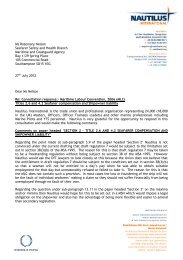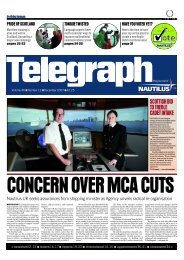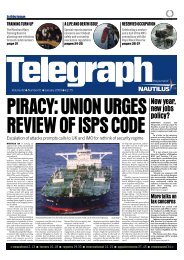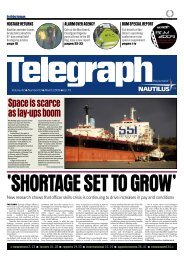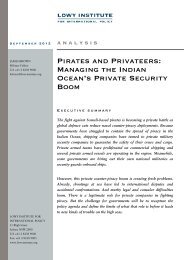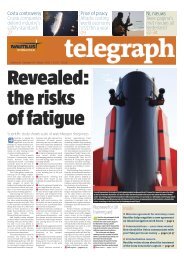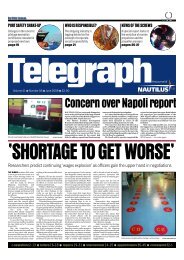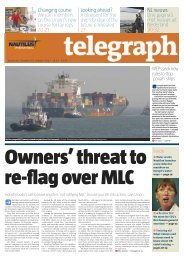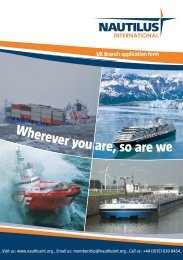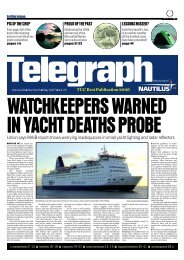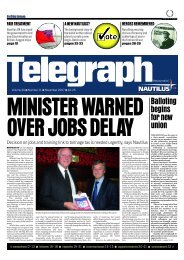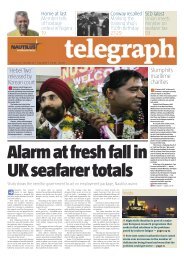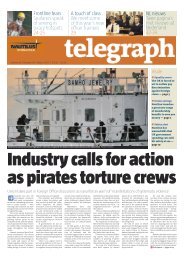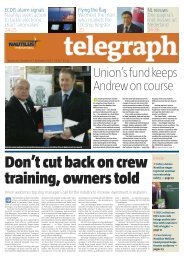NAUTILUS P01 NOVEMBER 2009.qxd - Nautilus International
NAUTILUS P01 NOVEMBER 2009.qxd - Nautilus International
NAUTILUS P01 NOVEMBER 2009.qxd - Nautilus International
You also want an ePaper? Increase the reach of your titles
YUMPU automatically turns print PDFs into web optimized ePapers that Google loves.
November 2009 | nautilusint.org | telegraph | 19<br />
SAFETY AT SEA<br />
Crewing<br />
issues were<br />
high on the<br />
agenda when<br />
international<br />
marine<br />
insurers held<br />
their annual<br />
meeting,<br />
Denzil Stuart<br />
reports…<br />
The Turkish bulk carrier<br />
Seli 1 has been abandoned<br />
by its owners and insurers<br />
after running aground off<br />
South Africa Picture: Mike<br />
Hutchings/Reuters<br />
Try talking to officers,<br />
ship insurers are told<br />
C<br />
“<br />
Isn’t it time to get<br />
closer to the business<br />
you are insuring?<br />
”<br />
Are you experienced? Insurers are concerned at the<br />
marked fall in average time in rank for chief officers<br />
Graphic: June Cattini/UK P&I Club<br />
Marine insurers ought<br />
to visit the ships they<br />
insure and talk to the<br />
seafarers onboard to find out the<br />
realities of life at sea, the annual<br />
conference of the <strong>International</strong><br />
Union of Marine Insurance was<br />
told.<br />
This year’s conference, held in<br />
Bruges, was extremely well<br />
attended and was judged very successful<br />
— yet the underlying<br />
mood was sombre.<br />
President Deirdre Littlefield<br />
set the scene at the outset of the<br />
three-day meeting. She said the<br />
common theme selected this<br />
year, ‘Marine insurance — mastering<br />
rough seas’, was intentionally<br />
broad to address the global<br />
economic storm ‘that continues<br />
to batter all of us personally and<br />
professionally, and the issues we<br />
must all understand and hopefully<br />
master to ride out this storm<br />
successfully’.<br />
Where only a short time ago<br />
there were shortages of vessels,<br />
now there was a glut, the meeting<br />
heard. HSBC Global Research had<br />
reported that about 45% of new<br />
boxship capacity scheduled for<br />
delivery in 2010 would be delayed<br />
or cancelled over the next two<br />
years. And Lloyd’s Marine Intelligence<br />
Unit estimated that around<br />
10% of the global boxship fleet<br />
was sitting idle due to slumping<br />
world trade.<br />
‘Unfortunately, despite the<br />
delays and cancellations and<br />
plans for accelerated scrapping,<br />
there are still too many ships<br />
chasing too little cargo, and a huge<br />
amount of new tonnage is still on<br />
order,’ Ms Littlefield warned.<br />
Indeed, IUMI’s facts and figures<br />
committee reported that the<br />
world fleet in 2008 showed a net<br />
growth of 7% in gross tonnage and<br />
3% in volume over 2007. The<br />
growth in the fleet over the last 10<br />
years is a staggering 46% in gross<br />
tonnage and 12% in volume.<br />
This growing tonnage oversupply<br />
problem impacts on the<br />
question of crewing — and that<br />
was why IUMI’s loss prevention<br />
committee focused on seafarers<br />
in its workshop in Bruges.<br />
In a very challenging but comprehensive<br />
presentation, principal<br />
speaker Guy Morel — general<br />
secretary of InterManager, the<br />
<strong>International</strong> Ship Managers’<br />
Association — put underwriters<br />
on the spot by urging them to visit<br />
the ships they insure.<br />
His blunt message was: ‘You do<br />
not generally have direct contact<br />
with our crews, but your business<br />
profitability depends to a substantial<br />
degree on these crews. So,<br />
isn’t it time to get closer to the<br />
business you are insuring?<br />
‘Send your inspector on board,<br />
and let him take time to interview<br />
the crews — mainly the officers,’<br />
Mr Morel added. ‘You will learn<br />
greatly from their comments on<br />
their relationship to shore and on<br />
their general approach to loss prevention.<br />
Do not hesitate to visit<br />
your ship managers and talk to<br />
their crew department. Ask them<br />
what they are doing in terms of<br />
crew training, how they are developing<br />
their crew loyalty programmes.’<br />
Earlier, he showed two slides.<br />
The first — thanks to the UK P&I<br />
Club — showed the distribution<br />
of experience in rank for chief<br />
officers. It indicated that in 2007<br />
the median experience in their<br />
rank was 2.8 years — down from<br />
4.3 years in 1995.<br />
The second slide — from Intertanko<br />
— showed how incident<br />
rates on tankers had bottomed<br />
out between 2000 and 2005,<br />
thanks to the development of a set<br />
of regulations that had had positive<br />
effects on security and safety.<br />
But it also showed that incidents<br />
were rising again.<br />
‘It may be a bit of a shortcut to<br />
equate this rise in incident rates to<br />
the shortening of experience in<br />
rank, but it is also difficult to discard<br />
it completely, Mr Morel said,<br />
adding that ‘an obvious case of the<br />
correlation between loss prevention<br />
and crew training and skills’.<br />
Mr Morel said that the function<br />
of ship manager was becoming<br />
more and more central to the<br />
shipping world. In fact, the last 10<br />
years had seen the transfer of<br />
responsibility for crew recruitment,<br />
training and management<br />
slip away from owners to managers<br />
— be they ship managers, crew<br />
managers or crew agents. The<br />
activities of InterManager had<br />
further enhanced this situation.<br />
His association — representing<br />
some 3,500 ships — is promoting<br />
a number of actions, including<br />
a code of conduct promoting<br />
transparency and ethics in ship<br />
management, training of cadets,<br />
and the unfair criminalisation of<br />
officers.<br />
Reviewing the current environment,<br />
the InterManager general<br />
secretary gave a downbeat<br />
prognosis as the deepest down<br />
cycle experienced in shipping for<br />
decades continued. He thought<br />
the chances of getting out of trouble<br />
soon were very slim for several<br />
years ahead — so people would<br />
suffer more and bankruptcies<br />
would become more and more<br />
common.<br />
And owners would try to<br />
reduce running costs to the maximum,<br />
instructing their ship managers<br />
accordingly, while all<br />
expenses without any immediate<br />
justification were or would be<br />
slashed — including the cost of<br />
crew training, as this was an<br />
investment in the future. So all<br />
the signs pointed to a worsening<br />
crew shortage situation for the<br />
future, he added.<br />
Examining the question of<br />
shortages, Mr Morel said they had<br />
to differentiate between the<br />
immediate problem and the<br />
future. In the short term, the pressure<br />
for quality officers had been<br />
great, leading to a massive increase<br />
in crew wages in the last four<br />
years. However, it was correct to<br />
say that the numbers had still<br />
been sufficient to avoid a ship<br />
remaining stuck alongside due to<br />
lack of crew.<br />
For the longer term, however,<br />
all agreed that the potential shortage<br />
was massive. At the height of<br />
the booming market, last year,<br />
some were forecasting a shortage<br />
of up to 50,000 officers for 2012. If<br />
the shortage was evenly distributed,<br />
and assuming an average of<br />
10 officers per ship, and an average<br />
of two officers for each position,<br />
this would mean that 2,500<br />
ships would not be able to leave<br />
port by 2012. And if the shortage<br />
concerned mostly the three top<br />
officers, then the number of ships<br />
affected could be closer to<br />
10,000.<br />
It was generally agreed that the<br />
number of ratings was sufficient,<br />
so the shortage was only concentrated<br />
on officers — most acutely,<br />
senior officers. Mr Morel said:<br />
‘This was the result of decisions<br />
made some 10-15 years ago. At that<br />
time, the world of shipping was<br />
discovering Asian crews, with<br />
their cost advantage. So we<br />
thoughtlessly dropped the<br />
employment and training of<br />
young European officers to<br />
replace them with junior Asian<br />
officers. After 10-15 years, the then<br />
senior European officers had<br />
retired, and the ex-junior Asian<br />
officers have not been trained to<br />
take up senior positions.’<br />
Could the present economic<br />
crisis reduce the need for additional<br />
crews, Mr Morel asked. ‘We<br />
have seen that we need to eliminate<br />
a minimum of 2,500 ships. Is<br />
that possible? If we assume there<br />
are about 50,000 oceangoing<br />
ships today, and another 10,000<br />
on order, this means that 4% to 5%<br />
of the world fleet would be without<br />
crew, thus inoperative.’ This<br />
might be possible, he thought, but<br />
demand needed also to be analysed,<br />
or the industry might find<br />
itself in a situation where more<br />
ships were needed but could not<br />
be manned.<br />
‘Finally, even if the present crisis<br />
gives some breathing space,<br />
the shortage would only be postponed,<br />
not solved,’ he warned. ‘I<br />
believe therefore it is essential to<br />
act today for the potential shortages<br />
of tomorrow.’<br />
Piracy was another hot topic at<br />
IUMI, as might be expected, and a<br />
special workshop was devoted to<br />
the subject. One speaker predicted<br />
that the coalition naval forces<br />
in the area will improve their<br />
cooperation. The pirates’ success<br />
rate would reduce and ransom<br />
payments would drop, too, to a<br />
much more manageable level.<br />
However, he added that no one<br />
knew if ransom payments were<br />
used to fund terrorism.




